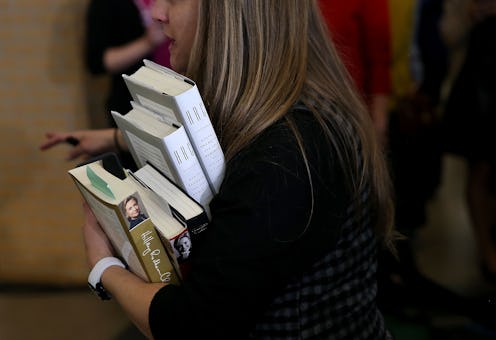News
A New TSA Policy Might Make You Remove Your Books From Carry Ons

A new security policy at the airport could make your summer travel a lot more stressful — the TSA may make you remove reading material from your carry on luggage starting soon. The revised security guidelines, which were rolled out in airports in Missouri and California, would force passengers to remove previously x-rayed items such as books and magazines, as well as food, in order to be screened separately.
The specifics of the policy change aren't clear yet, but security line searches could be much more extensive than they currently are. According to passengers at Kansas City International Airport who were screened as part of a pilot program of the new policy, all paper products, including Post-It notes, had to be screened separately from the rest of the luggage. Food was also required to be isolated from other belongings.
"[TSA] searched through my] entire bag to find two blocks of Post-It notes," one passenger told Kansas City NBC affiliate KSHB. "They were even in a separate bag within my suitcase. They put them in a separate bin and put them back through security.”
Secretary of Homeland Security John Kelly spoke about the new policy in May, stating that he will "likely" make the expanded searches nationwide. According to Kelly, travelers trying to avoid checked baggage fees are overstuffing their carry-on bags and making surveillance more difficult, which prompted the policy change.
"The reason we've done that is because of — people trying to avoid the $25 or $50 or whatever it is to check a bag are now stuffing your carry-on bags to the point of, you know — well, they can't get any more in there," Kelly told Fox News' Chris Wallace last month when asked about the motivation for the shift in policy. "So, the more you stuff in there, the less the TSA professionals that are looking at what's in those bags through the monitors, they can't tell what's in the bags anymore."
The ACLU isn't too happy about TSA's new magnifying glass into Americans' personal effects, which the organization detailed in a blog post last week. "There is a long history of special legal protection for the privacy of one’s reading habits in the United States," wrote Jay Stanley, senior policy analyst for the ACLU's Speech, Privacy, and Technology Project.
Despite the privacy invasion that such searches represent, we do preserve a fair degree of practical privacy when we are allowed to keep our bags closed as we submit them to the x-rays. Insofar as the agency is going to force passengers to unpack when being screened, it should be done in such a way as to minimize the invasiveness of that change.
Privacy concerns remain paramount, in 2015, a TSA performance test showed that some officers missed more than 95 percent of explosives that passed through their screening systems. The new policy may make travel a little more burdensome, but advocates say it has the potential to keep people safer.